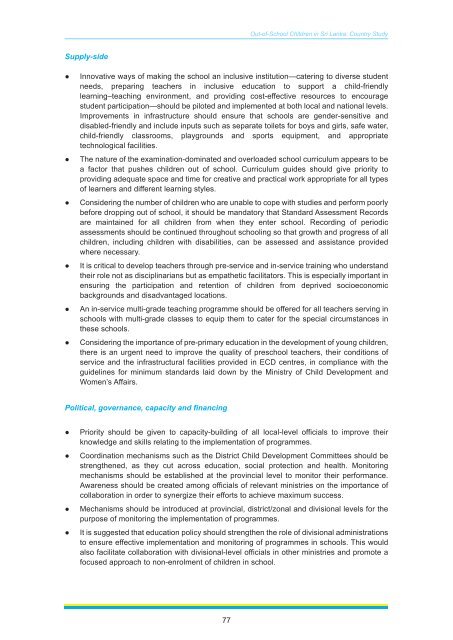Sri Lanka - Institut de statistique de l'Unesco
Sri Lanka - Institut de statistique de l'Unesco
Sri Lanka - Institut de statistique de l'Unesco
You also want an ePaper? Increase the reach of your titles
YUMPU automatically turns print PDFs into web optimized ePapers that Google loves.
Out-of-School Children in <strong>Sri</strong> <strong>Lanka</strong>: Country Study<br />
Supply-si<strong>de</strong><br />
●<br />
●<br />
●<br />
●<br />
●<br />
●<br />
Innovative ways of making the school an inclusive institution—catering to diverse stu<strong>de</strong>nt<br />
needs, preparing teachers in inclusive education to support a child-friendly<br />
learning–teaching environment, and providing cost-effective resources to encourage<br />
stu<strong>de</strong>nt participation—should be piloted and implemented at both local and national levels.<br />
Improvements in infrastructure should ensure that schools are gen<strong>de</strong>r-sensitive and<br />
disabled-friendly and inclu<strong>de</strong> inputs such as separate toilets for boys and girls, safe water,<br />
child-friendly classrooms, playgrounds and sports equipment, and appropriate<br />
technological facilities.<br />
The nature of the examination-dominated and overloa<strong>de</strong>d school curriculum appears to be<br />
a factor that pushes children out of school. Curriculum gui<strong>de</strong>s should give priority to<br />
providing a<strong>de</strong>quate space and time for creative and practical work appropriate for all types<br />
of learners and different learning styles.<br />
Consi<strong>de</strong>ring the number of children who are unable to cope with studies and perform poorly<br />
before dropping out of school, it should be mandatory that Standard Assessment Records<br />
are maintained for all children from when they enter school. Recording of periodic<br />
assessments should be continued throughout schooling so that growth and progress of all<br />
children, including children with disabilities, can be assessed and assistance provi<strong>de</strong>d<br />
where necessary.<br />
It is critical to <strong>de</strong>velop teachers through pre-service and in-service training who un<strong>de</strong>rstand<br />
their role not as disciplinarians but as empathetic facilitators. This is especially important in<br />
ensuring the participation and retention of children from <strong>de</strong>prived socioeconomic<br />
backgrounds and disadvantaged locations.<br />
An in-service multi-gra<strong>de</strong> teaching programme should be offered for all teachers serving in<br />
schools with multi-gra<strong>de</strong> classes to equip them to cater for the special circumstances in<br />
these schools.<br />
Consi<strong>de</strong>ring the importance of pre-primary education in the <strong>de</strong>velopment of young children,<br />
there is an urgent need to improve the quality of preschool teachers, their conditions of<br />
service and the infrastructural facilities provi<strong>de</strong>d in ECD centres, in compliance with the<br />
gui<strong>de</strong>lines for minimum standards laid down by the Ministry of Child Development and<br />
Women’s Affairs.<br />
Political, governance, capacity and financing<br />
●<br />
●<br />
●<br />
●<br />
Priority should be given to capacity-building of all local-level officials to improve their<br />
knowledge and skills relating to the implementation of programmes.<br />
Coordination mechanisms such as the District Child Development Committees should be<br />
strengthened, as they cut across education, social protection and health. Monitoring<br />
mechanisms should be established at the provincial level to monitor their performance.<br />
Awareness should be created among officials of relevant ministries on the importance of<br />
collaboration in or<strong>de</strong>r to synergize their efforts to achieve maximum success.<br />
Mechanisms should be introduced at provincial, district/zonal and divisional levels for the<br />
purpose of monitoring the implementation of programmes.<br />
It is suggested that education policy should strengthen the role of divisional administrations<br />
to ensure effective implementation and monitoring of programmes in schools. This would<br />
also facilitate collaboration with divisional-level officials in other ministries and promote a<br />
focused approach to non-enrolment of children in school.<br />
77

















